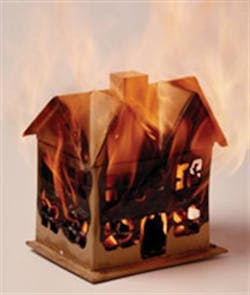Protection from the unexpected: From accidents to computer crashes, insurance agencies have you covered
Some insurance policies are familiar and are purchased without much debate. You own a business; you need it to be adequately covered. These policies include property, liability, workers' comp, business auto, group health, life and disability.
But there are many others that should be considered, say experts in the insurance field. You need to examine your risks and buy the policies that make sense - policies that will help keep you up and running or return you to normal business as soon as possible after a disaster strikes - be that disaster in the form of a fire, a hurricane, flood, or a vehicle or computer crash.
Here are some thoughts on common and not so common policies that need to be examined and updated.
* Property insurance -- "Property insurance is probably the least expensive of all the coverages a tire dealer purchases, and yet oftentimes this is where we'll see shortages in terms of limits," says Gerry Cecil, national director of field marketing for Zurich North America's Direct Underwriters business unit.
"Lots of folks insure their buildings for what they bought them for or what they can buy a similar building for. They need to insure them for what it would cost to replace it with like kind and quality," Cecil notes.
The best approach is to make sure you're insured to the proper limit on the high end, and if you're interested in reducing premiums, do so with larger deductibles, says Cecil.
[PAGEBREAK]
If you lease your building, to meet your lease agreement you need to make sure you have proper coverage - which should include fire and legal liability to cover damage you may cause to the structure due to your own negligence.
You also need to cover your tire and wheel stock and service equipment such as lifts, diagnostic equipment and tools. And you should generate a statement of values on an annual basis to make sure that these items are always insured for a proper amount.
* Garage keeper's -- The second most significant investment people make is in their automobile, notes Cecil, and when their vehicle is in your care, custody or control you are responsible for it. If the vehicle is damaged due to an unfortunate act, say an accident during a test drive, you need to have good garage keeper's coverage to cover damages.
Make sure limits are adequate, and have a million if not several million dollars worth of umbrella coverage above your underlying coverages to cover the unexpected.
* Your employees' tools -- There are two schools of thought on this issue, says Cecil. While some employers insure their employees' tools, others feel that the employee should carry the insurance. Either way, don't guess on this. Make sure those tools are covered, because most technicians have a significant investment in their tool boxes and loss of the tools means loss of productivity for your dealership if those tools are stolen or damaged.
* Customer complaint coverage -- If a customer is not happy with something you did to their vehicle - say they don't like the way the car rides after you've repaired it and you just can't make them happy no matter what you offer to do, they may end up taking you to small claims court. Customer complaint insurance can cover these costs.
* Breakdown of equipment -- This is insurance coverage protecting you against the breakdown of your vehicle lifts and telephones, diagnostic tools, other service equipment and even your computers.
* E-risk coverage -- "Computer hacking has become an Olympic sport," says Cecil. "There are many folks out there trying to hack into your Web site. So if you do a lot of selling on the Internet, this insurance is a good one to have."
* Business interruption and extra expense -- "Most dealers don't think about the fact that if they have a serious loss, they are likely to be shut down for a period of time," says Cecil. "They could lose profits and customers until they are up and running again and could even lose employees if the business is shuttered for a long time. So even if properly covered for building and contents, they could still go out of business if unable to maintain gross profits to stay afloat. At the least they should purchase extra expense coverage to enable them to operate from another location temporarily -- extra expense coverage enables them to do that by covering much of the extra expense they would incur.
"The fact is that an auto-related business with service bays, etc., may need additional time to rebuild to meet zoning, environmental and other requirements," Cecil says. And weather conditions may also dictate when rebuilding can begin.
[PAGEBREAK]
* Cargo exposure -- Cargo exposure insurance covers the larger trucks you use to transport products from store to store, or from wholesale to retail locations. This insurance covers significant inventory against theft, fire or damage caused by a mishap such as an overturned vehicle.
* Pollution liability -- "As a generator of hazardous waste, there's the cradle-to-grave exposure that tire dealers have, whether they like it or not," says Cecil. "They get tossed into the same bucket with everyone else that generates waste -- such as oil, antifreeze, hydraulic fluids, etc. They will need to use a certified, licensed and insured pollution removal firm. But make sure that firm does not have inadequate insurance limits. The facility to which the pollutant is taken might become compromised and leak causing damage to third-party adjoining properties or ground water.
“And all the folks who sent the hazardous waste to be deposited at that location very well could be brought into litigation as potentially responsible parties (PRPs). Defense costs alone will be a significant blow."
* Cargo pollution -- This insurance covers accidents involving roadway spills of hazardous materials such as motor oil and antifreeze when one of your transport vehicles is involved in an accident.
* Fiduciary liability -- This covers a business' liability for administering employee benefit programs and covers discrimination, harassment, wrongful discharge, etc. "If you can get sued for it, someone will sell you insurance for it," says Michael Mathis, an AAI (Accredited Advisor in Insurance) for the Charles L. Crane Agency in St. Louis, Mo.,
* Director's and officer's liability -- These policies help assure the continuing operation of your business and cover unfair trade practices, cross suits between partners or co-owners, etc.
* Succession planning -- This insurance covers the smooth transition of one owner to another so employees can continue to have their livelihoods.
* Wind storm damage -- If you are in an area prone to hurricanes, such as the Gulf Coast, you may not be able to get this coverage from a regular insurance agent, says Cecil. On the other hand, windstorm coverage is routinely provided as a normal peril in non-hurricane-prone areas of the country.
"In hurricane-prone areas, dealers may need to get into a 'wind pool' that has been set up by various states that covers some wind damage. You need to make sure what is covered, and see if there are higher deductibles."
[PAGEBREAK]
* Flood insurance -- Normal business policies do not cover flood, Cecil notes. "For autos and cargo, perhaps, but rarely building and contents. In a flood-prone area, the dealer needs to look at the National Flood Insurance Program (NFIP)." Check out the Federal Emergency Management Association (FEMA) Web site www.fema.gov to see how your site is ranked as a potential flood zone. Then use that information to ask your insurance agent about the feasibility of purchasing flood insurance coverage.
Insurance agents recommend you get business appraisals done yearly and discuss your changing coverage needs annually with your insurance agent no less than two weeks before your insurance premium is due.
"You may decide not to buy certain insurance, but a good insurance agent will make sure you know all your risk exposure. You'll then be making an informed decision," Cecil concludes.
Product recall and liability insurance: Nail down the details before you need it
Product recall insurance might be included in your general insurance policy, but the limit of product recall coverage may be only $10,000 to $25,000, says Michael Mathis, an accredited advisor in insurance for the Charles L. Crane Agency.
"There are very few companies, Lloyds of London being one of them, which will offer recall insurance. But a policy to cover a $1 million recall may cost you roughly $150,000 to $200,000 annually. This is an issue for a direct importer, who is working with a company that does not have a U.S. presence to back them up."
Product liability is another issue that faces direct importers. Tire dealers should require suppliers to provide a current certificate of insurance on a manufacturer's product liability policy that names the dealer as an additional insured under the vendor's endorsement.
"Make sure you get certificates of insurance from all suppliers regardless of where they are located," says Gerry Cecil, national director of field marketing for Zurich North America's Direct Underwriters business unit.
"You need to take care of yourself and make sure that you have the means to lay any claim back to the manufacturer.
"Those doing business with a company without a U.S. presence could find themselves standing in the shoes of the manufacturer. Will the offshore company's insurance carrier respond to the recall? If they do, limits may be inadequate.
"Due to recent recalls, the die has been cast," Cecil says. "I think tire dealers will be a little bit more critical in the future and will think about protecting themselves, instead of assuming that what they are getting from importers is what they always got from a U.S.-based manufacturer."
About the Author

Bob Ulrich
Bob Ulrich was named Modern Tire Dealer editor in August 2000 and retired in January 2020. He joined the magazine in 1985 as assistant editor, and had been responsible for gathering statistical information for MTD's "Facts Issue" since 1993. He won numerous awards for editorial and feature writing, including five gold medals from the International Automotive Media Association. Bob earned a B.A. in English literature from Ohio Northern University and has a law degree from the University of Akron.
